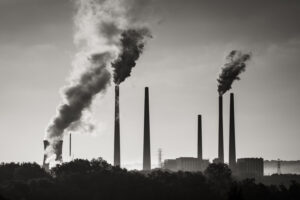Socialism or Barbarism! Truer than Ever?

 “We are experiencing an ecological and social crisis, driven by exponential capital accumulation, whose end result will be the extinction of human civilisation” (p. 18). While it is easy to shrug off such a dramatic claim, in Alienation, Spectacle, & Revolution: A Critical Marxist Essay, Neil Faulkner takes this relatively strong claim and endeavors to demonstrate its truth. Thus begins his project of updating our understanding of alienation—not an easy task, but one that Faulkner does well. In a time of a simultaneous dearth and deluge of information, Faulkner attempts to pull apart the dialectical and economic structures of the third industrial revolution and follows the breadcrumbs until he comes to a different “end of history.” Faulkner, who died in February 2022, was an archeologist and a political activist. He was a member of the Socialist Workers Party in the U.K. for many years and later a founding member of Anti-Capitalist Resistance. He wrote on topics ranging from the Arab-Anglo conflict to the history of the Olympics. While his corpus spanned several subjects, his books and articles all have a bitingly Marxist take that brought Faulkner much acclaim.
“We are experiencing an ecological and social crisis, driven by exponential capital accumulation, whose end result will be the extinction of human civilisation” (p. 18). While it is easy to shrug off such a dramatic claim, in Alienation, Spectacle, & Revolution: A Critical Marxist Essay, Neil Faulkner takes this relatively strong claim and endeavors to demonstrate its truth. Thus begins his project of updating our understanding of alienation—not an easy task, but one that Faulkner does well. In a time of a simultaneous dearth and deluge of information, Faulkner attempts to pull apart the dialectical and economic structures of the third industrial revolution and follows the breadcrumbs until he comes to a different “end of history.” Faulkner, who died in February 2022, was an archeologist and a political activist. He was a member of the Socialist Workers Party in the U.K. for many years and later a founding member of Anti-Capitalist Resistance. He wrote on topics ranging from the Arab-Anglo conflict to the history of the Olympics. While his corpus spanned several subjects, his books and articles all have a bitingly Marxist take that brought Faulkner much acclaim.
This book will interest readers who want to understand the social roots and intersection of our current ecological and humanitarian crises, especially those looking for an up-to-date Marxist approach to climate change. The few digressions into the stark landscape of the third industrial revolution*, where industry is primarily replaced by technology, argue that the same dialectical and social rules that characterized the first industrial revolution still apply. It also indicates that this trajectory of capitalism is quiet and often undetectable to the average person until it has normalized itself. The essay also sheds light on the nature of alienation and how new technology continues to shape capitalism and the wider society. Overall, Faulkner offers a Marxist analysis of contemporary capitalism.
“The Wall, the most powerful communication system in history, is a superlative mechanism for transmitting the hegemonic ideas of the ruling class, sedating social discontent, suffocating dissent, achieving consent” (p. 8). The wall that Faulkner speaks of in his prologue is a wall of screens (computers, phones, etc.) that has settled into the daily life of the western society. Faulkner sees this wall as the seductive nature of capitalism to pacify those who are economically and technologically oppressed. Faulkner argues for this because, to him, it takes the basic ideas of the ruling class and transmits them on a large scale, allowing capitalism to promote a misinformation campaign consumed by all to whom it can reach (by “The Wall,” advertising, etc.) This misinformation shapes Marx’s Industrial Reserve Army—a body of workers who desire the luxury of wealth but only have their labor power to sell. As a result, these (potential) laborers accept low wages with an illusory promise of upward mobility.
In his introduction, Faulkner begins by describing a hospital waiting room and how it is dominated by television screens and other visual technology. These screens, for Faulkner, indicate that the world of technology has a hegemonic hold on capitalism. So, Faulkner criticizes capitalism not merely in terms of class, but also in terms of the unique climate it has created in the era of the third industrial revolution.
Faulkner explains further: “One aspect of the eternal dialectical motion that constitutes social reality is that nothing that came before is ever entirely erased” (p. 26). Faulkner does not discuss dialectic in great detail, but he ties Marx’s dialectical analysis to the contemporary world. In doing this, he shows that the Marxist dialectical principal of “negation of negation” means that these revolutions in modes of production continue to contain some aspect of the past within itself, sublating itself but never losing its grounding in nature.
A significant component of the text is the threat posed by anthropogenic climate change. As Faulkner writes in chapter three:
The climate crisis can be understood as a metabolic rupture between Nature and Society—Nature in the sense of a finite but renewable resources of organic and inorganic matter capable of sustaining human life; Society in the sense of a global system of production, destruction, and waste propelled by capital accumulation (pp. 31-2).
Like Marx, Faulkner believes that capitalism’s perverse incentives drive the environmental crisis, and the inability to discard these incentives without what Faulkner will describe as revolution is not only a threat of pollution or temperature change but an existential threat that has yet to be fully appreciated. This explains his larger argument that capitalism, especially in the age of mass communication, generates vicious misinformation that drives the average person to believe that there is no other option than capitalism. This misinformation precludes understanding the genuine risk of the current climate crisis. It can only be seen as what Faulkner calls a “spectacle” that will lead to extinction unless the system that produces it is overturned by revolution. As Faulkner writes:
Because the crisis only continues and intensifies, because the proclamations of bourgeois politics have no practical meaning, and because the revolutionary alternative has not yet emerged, the crisis can take only the form of spectacle (pp. 42-3).
Having provided this framework, Faulkner then addresses other significant crises that he believes to be the direct result of the contradictions of capitalism. While we will not go in-depth here, he is most interested in the new forms of fascism that are arising, noting that they differ from the fascism that was known in the era between World War I and World War II. This, together with the rise of militarized police and international geopolitical conflicts, supports Faulkner’s thesis that capitalism provides perverse incentives that, in the short run, have benefits but which create impending disasters in the long run. Towards the end of the essay, Faulkner provides his most contentious argument: trade unions in the western world are declining. They are permanently de-teethed and will no longer be a beneficial force for the proletariat. The era of labor power has been demolished by capitalist union busting, and therefore the working class has no choice but to seek salvation in a violent revolution.
Faulkner finishes the text with pessimism regarding the ability of the proletariat to successfully achieve emancipation without revolution:
Revolution is an existential imperative, but despite hundreds of millions engaged in militant street protests across the world, the masses have not yet constituted themselves as a revolutionary agent, that is, organised themselves in organs of participatory democracy in the context of class struggle from below (p. 106).
This concern for the necessity of revolution and the proletariat’s inability to overcome bourgeois power drives Faulkner to leave us with a Marxist cliffhanger—an unresolved crisis with underdeveloped responses. Faulkner ends the essay, by warning, “Those who half make a revolution merely dig their own graves” (p. 115). Faulkner seems to see this as both a warning and a call to arms.
The essay makes several very significant claims. Faulkner describes current conditions and class struggles, grounding his claims in the material reality as it appears now. His understanding of history and his ability to see into the needs of society at large allows him to make broader claims and back them up. However, these same claims are also the difficult part of this text. As the passage at the beginning of the review shows, Faulkner makes grand claims about issues such as extinction. While he has some science to back up his fears, these claims are underdeveloped and seem more dramatic than genuinely urgent. This tendency towards shock value makes some text inaccessible, especially for those who may not have read much Marxist literature.
Faulkner has a firm grasp of Marxism and contemporary issues and the ability to trace trajectories beginning as far back as the start of the industrial revolution. The uncertainty of the text and its momentary dramatics is an apparent response to a confused and unjust system that he feels requires more direct language. Faulkner may be wrong that we are on the verge of extinction, but not heeding his warning and ignoring the historical analysis may be a mistake. Whether it means extinction or just reified oppression, Faulkner sounds alarms, and we should listen.